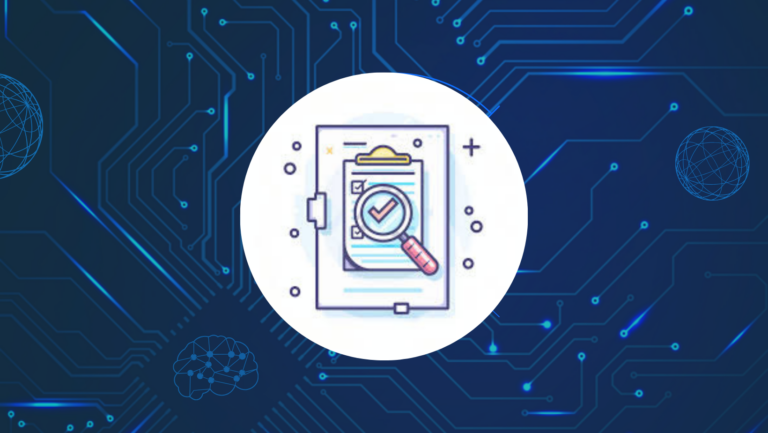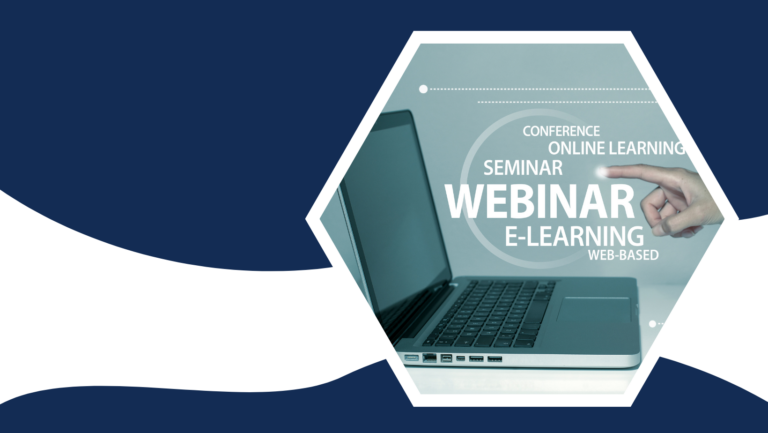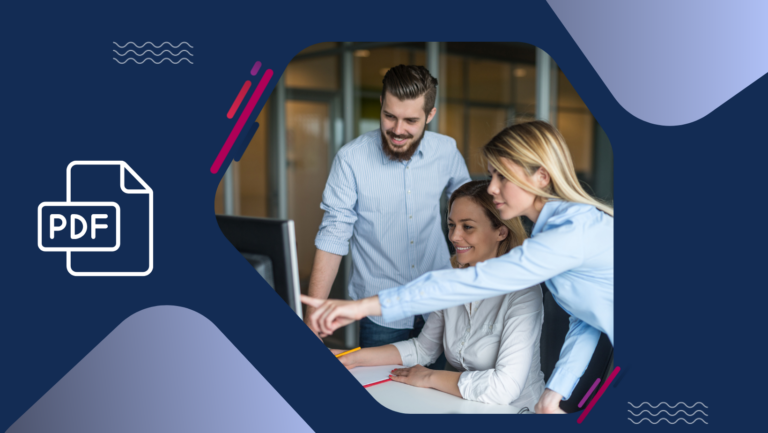We are pleased to present an interview with one of our colleagues, Alex Chheav, who recently earned the ADS certification from IAAP (International Association of Accessibility Professionals). This certification attests to advanced skills in managing document accessibility, an important aspect for companies aiming to comply with international standards.
Alex, our Chief of Production & IA Support, shared his professional journey with us, which began in 2010 at Ipedis, the parent company of DocAxess. With a strong background in multimedia project management and a specialization in digital accessibility, he has developed and refined his expertise in this field. Through a combination of studies and hands-on experience, he has gained valuable expertise in document and video accessibility.
In this interview, we discussed the details of the IAAP certification and its impact on his work at DocAxess. He explained how this certification strengthens our team’s credibility and skills, while also bringing significant benefits to the company, especially in the context of bids and tenders.
Finally, we explored current and future trends in digital accessibility and how DocAxess is preparing to meet emerging challenges through innovation and the use of artificial intelligence.
Hello Alex, could you introduce yourself and tell us about your journey at DocAxess?
I’m Alex Chheav, the Chief of Production & IA Support at DocAxess. I started in 2010 at Ipedis, the parent company of DocAxess, while pursuing a professional degree in Technical Communication, specializing in Web and Multimedia Design and Integration.
Initially, my tasks were mainly focused on providing multimedia support: making video files accessible, assisting in creating accessible content for websites, and so on.
I continued my studies with a Master’s in Multimedia Project Management, also in a work-study format, which allowed me to concentrate more on project management, production, publication management, and the processing of PDFs and videos. My goal in managing production teams was to diversify activities and continuously improve products and processes.
Before joining DocAxess, were you familiar with the topic of digital accessibility?
I had already gained some initial experience in this field during my studies, where one of my favorite subjects was web integration. I was particularly interested in this discipline, and we were already being made aware of web accessibility principles. For example, we learned about the importance of providing descriptions for images, and our professor explained the reasons behind these practices.
When I began my search for a company for my work-study program, I discovered Ipedis and quickly recognized the importance of their work in this area. My prior knowledge allowed me to immediately understand their commitment to accessibility and see how my skills could integrate and contribute to their goals.
You recently obtained the IAAP certification. Could you explain what IAAP is and what the ADS certification entails?
IAAP is a global association of organizations and professionals who have come together to define, promote, and improve the accessibility of services, products, and environments for people with disabilities. In addition to offering a variety of membership options for individuals and organizations, IAAP provides training for accessibility professionals. These educational opportunities cover all levels, from beginner to expert, and include both online and in-person options.
IAAP also offers a range of foundational and technical accessibility certifications, including the ADS certification. This certification, known as ‘ADS by IAAP,’ is specifically focused on document accessibility.
This certification is sometimes required by certain organizations, including governmental and European bodies, as part of their tender requirements. This motivated us to take part in the exam. Various tenders aimed to improve document accessibility for websites and certain office documents. The ADS certification validates expertise in managing accessibility for these types of documents, encompassing both technical aspects and communication strategies.
Has your experience in digital accessibility at DocAxess been helpful in preparing for the ADS certification?
From IAAP’s side, candidates have access to various resources, including preparation programs for certification. To prepare for the ADS certification, it’s important to familiarize oneself with the exam content, which provides an overview of the exam structure, including section weighting and scoring. Candidates should consult the IAAP ADS Body of Knowledge (BOK) to understand key concepts, terms, and activities within the ADS professional domain. It’s important to recognize that the certification assesses practical and functional knowledge, not the completion of a specific course. It’s also essential for candidates to assess their current knowledge to identify strengths and areas that need more focus on.
It’s recommended to dedicate 5 to 10 hours per week over 6 to 8 weeks to exam preparation. This preparation time, equivalent to about 80 hours, represents approximately two years of experience in the field.
However, it’s important to note that the application is not immediately accepted; an association committee reviews the candidate’s application, background, and motivations for obtaining the certification. Given my experience in digital accessibility, I didn’t need intensive preparation. However, I did consult the preparation book to cover aspects less frequently encountered in my daily work, such as planning and strategies. This approach allowed me to fill in knowledge gaps and ensure I was well-prepared for the exam.
How does the ADS certification specifically contribute to your work and benefit DocAxess?
Since 2021, the ADS certification has been recognized as a mark of high competence in the field of documents and accessibility. As a holder, I am part of a select group of international professionals who have honed their skills in creating, testing, and remediating accessible documents. This certification validates my expertise and highlights my ability to apply best practices in accessibility.
Initially, obtaining this certification was a requirement to respond to certain tenders. However, with my experience in the field, it has enhanced the official recognition of my expertise. It confirms my years of experience and strengthens the credibility of my professional journey, adding tangible value to my CV.
For our company, this certification offers several significant advantages. It enhances our credibility and expertise in digital accessibility, improving our market position and increasing the trust of potential clients. Additionally, it demonstrates our commitment to quality standards and best practices, which can help us win new contracts, particularly those requiring specific qualifications.
This certification also allows our company to differentiate itself from the competition by showcasing officially recognized expertise, a valuable asset in business proposals and tenders. Internally, it recognizes our skills and contributes to our ongoing professional development, fostering a culture of excellence and encouraging innovation in our projects.
What can you tell us about the evolution of digital accessibility, particularly in office documents?
Digital accessibility has truly become mainstream in recent years, largely due to legal obligations that have accelerated this evolution. In 2010, when I explained my work in digital accessibility, many people had difficulty understanding what it was about. Today, there has been significant progress, and people are much more aware of this issue, making it much easier to explain my work.
Take the iPhone in 2010, for example: it was still relatively new technology, and features like VoiceOver or Siri weren’t well-known. These tools have greatly contributed to improving accessibility for people with disabilities. Similarly, in office softwares like Word or Acrobat, accessibility options have significantly evolved. For example, in Word 2007, adding alt text to an image was quite complicated and hidden in menus. Today, this feature is much more accessible and prominent, making digital inclusion easier.
In summary, there has been a collective awakening and significant technological advances that have made digital accessibility more common and easier to explain.
At DocAxess, how are we anticipating new trends and overcoming emerging challenges in the digital accessibility sector?
Our main challenge is to democratize and industrialize document accessibility. If we continue to take a “craft” approach, we won’t be able to advance quickly. That’s why our AI projects are heavily oriented in this direction.
We are focusing on leveraging artificial intelligence to process large volumes of our clients’ documents, such as financial reports, payslips, and invoices. Our R&D team is dedicated to this mission, conducting AI research and filing patents. We are implementing many strategies to ensure a long-term vision and remain at the forefront of innovation.
Conclusion
This conversation with Alex provides insight into the importance of this certification in the field of digital accessibility. With fewer than 200 holders worldwide, this certification is a major asset. The full list of holders is available on the IAAP website: IAAP ADS Certificants.
The certification enhances DocAxess’s credibility in the market, enabling us to respond effectively to demanding tenders and stand out in a competitive sector. Our commitment to innovation, particularly with artificial intelligence, reflects our determination to democratize document accessibility on a large scale. By investing in R&D and aiming for industrialized solutions, DocAxess positions itself as a leader ready to tackle future challenges in digital accessibility.
Stay connected to discover our upcoming initiatives and contributions to an inclusive digital environment!













